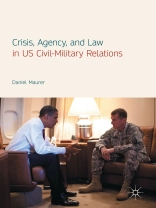This book develops a responsible and practical method for evaluating the success, failure, or “crisis” of American civil-military relations among its political and uniformed elite. The author’s premise is that currently there is no objectively fair way for the public at large or the strategic-level elites to assess whether the critical and often obscured relationships between Generals, Admirals, and Statesmen function as they ought to under the US constitutional system. By treating these relationships—in form and practice—as part of a wider principal (civilian)-agency (military) dynamic, the book tracks the “duties”—care, competence, diligence, confidentiality, scope of responsibility—and perceived shortcomings in the interactions between US civilian political authorities and their military advisors in both peacetime and in war.
Tabela de Conteúdo
1. Introduction .- 2. The Opening Statement .- 3. The Case-in-Chief: What the Law Does (Not) Say .- 4. The Expert Witnesses: A Cross-Examination .- 5. The Expert Witnesses: Fingerprints of Agency .- 6. The Rebuttal Witnesses: From Agency to Norms to Diagnosis .- 7. Exhibit A: Scope of Responsibility and Authority .- 8. Boundaries, or A “Poverty of Useful and Unambiguous Authority?” .- 9. Exhibit B: When Fidelity and Frankness Conflict .- 10. Exhibit C: Amending the Goldwater-Nichols Act .- 11. Exhibit D: The Future Fallacy, A Civ-Mil Dialogue .- 12. Closing Argument.
Sobre o autor
Major Dan Maurer is a combat veteran, former engineer officer, and has practiced military law as a prosecutor in courts-martial, as an appellate counsel, and in leadership positions within the Army Judge Advocate General’s Corps. He is a contributing author at the United States Military Academy’s Modern War Institute.












